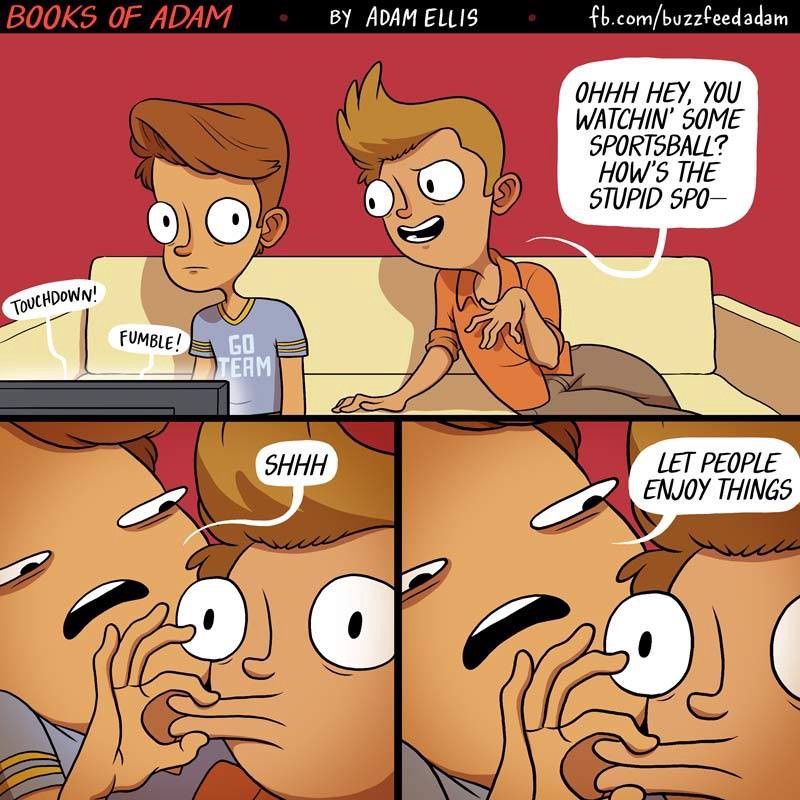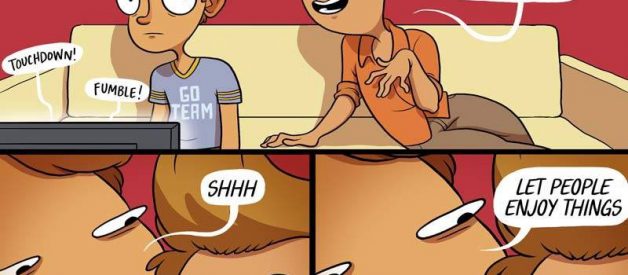Why are so many pop culture fanatics threatened by disagreement?
Unless you?re spending your first visit to the internet reading this article (in which case, I?m honored) you?ve probably seen an excerpt from this webcomic by artist Adam Ellis before. If there?s a semi-viral tweet voicing a minority opinion about a popular thing, it?ll be in the replies. It?s the ultimate expression of contempt for the mere idea that someone could not like an element of pop culture. What I didn?t know until seeing the full comic for the first time was that it?s been somewhat altered from its original context.

We see in the original that the refrain ?let people enjoy things? is not meant as a defense of some nerd culture object, as the last two panels are so often used, but as a rejoinder to tired nerd dismissal of sports fandom. It was a message to the current gatekeepers of pop culture to stop being so annoying about people who enjoy watching football. Football, in this admittedly absurd and unrealistic context, is the underdog when compared to wildly successful genre film and television.
So why do so many people use the comic to defend the most popular things on the planet? What do they even mean by ?let people enjoy things?? Having been beset by scores of angry commenters every time I post about a Marvel movie on Letterboxd, I think I have the necessary experience to unpack this idea.
It all comes back to the paradoxical fact that fans of the world?s most popular media are intensely insecure in their fandom. Avengers: Endgame is on track to make more money than any film has ever made before. So why do fans brigade negative reviews? When I posted about Endgame on Letterboxd, there was something that came up again and again in furious comments: ?You made me feel bad for liking the movie.? Now, you can judge for yourself whether my review was at all patronizing. I think there?s something revealing here, though. If you hold an opinion about a movie, why should reading an opposing one make you feel bad? Unless, of course, you?re not secure in your own opinion. Unless you feel there?s some truth in those opposing arguments.
I?m not saying I?m objectively right about any movie. That?s not possible for anyone. I?m just saying that I think the notion that a negative review could make someone feel bad for liking a movie says less about the review than it does about the person reading it. It indicates to me that they want to like a movie and not think too deeply about why they like it, out of fear that introspection would lead to them not liking it anymore. So they lash out at critics, even if those critics are a tiny minority. They can?t feel comfortable just being part of a titanic pop-cultural movement. Any suggestion of disagreement has to be eradicated, because that hint of opposition is a reminder that it?s possible to not like the thing. And if that?s possible, should they?
So we see the comic posted everywhere. ?Let people enjoy things.? What it really means is ?You?re not allowed to not enjoy things.?It?s a fundamentally broken way to look at art. Why do so many people perceive a dissenting opinion as a literal attack on affirmative ones? Especially in a case where the affirmative opinions are in such overwhelming majority? People are so threatened by the existence of disagreement, or even just of abstinence. In this new pop culture landscape, to merely opt out of these massive events is considered snobbish and uppity. You see a million viral tweets that scream ?No one cares that you don?t watch Game of Thrones! Let people enjoy things!? as if it?s somehow hurting your enjoyment that other people choose not to engage. Non-participation is considered at best a social faux pas and at worst a sneering act of malice. It?s insane.
And there?s something even more sinister going on here. It?s no coincidence that you never see the comic posted in response to criticism of some understated indie drama or underground Bandcamp musician. You only ever see it used to defend the commercial output of mega-corporations; your Marvel, your Game of Thrones, your Ariana Grande, etc. It?s no surprise, either. A recent development in corporate art is the positioning of it as a cultural underdog, constantly under siege from Haters and Trolls. You see it most with the nerd properties mentioned above. They parry the childhood fear of being bullied for liking nerd stuff into the suggestion that those bullies are still out there, waiting to pounce, and they take the form of everyone who dares to not like the IP in question.
It?s just marketing, but it?s worked astonishingly well. It lets a company like Disney, nearing monopolistic status in the film industry, pretend to be victimized by minor dissent. And their fans are such obsessives that they weaponize themselves in its defense. Disney doesn?t need to pay critics to give their films good reviews. Critics will do it for free, because who wants to be the one guy who isn?t on board? Who wants to be the bully? Certainly no one wants to be inundated with cruel and vindictive comments. I?m not saying that every critic who writes a positive review of an Avengers movie isn?t being genuine. But the culture Disney has built for us makes it harder to write a negative review than a positive one.
So if any ?let people enjoy things? posters are reading this, I?m going to politely ask for a little introspection on your part. What is it about negative reviews that threatens your enjoyment of a thing? I can tell you with certainty that no positive review of a thing I dislike has ever made me feel insecure about my own opinion. I?ve found those takes interesting and worth thinking about, and it?s even happened before that my own opinion was swayed by different reads and analyses. It?s okay to change your mind about something after reading something that disagrees with you. It?s okay to not change your mind and continue believing what you believe. What?s not okay is telling people to shut up because they aren?t part of your hivemind. I?m grabbing your lips now and holding them closed. Please, let people not enjoy things. It?s not going to hurt you.


